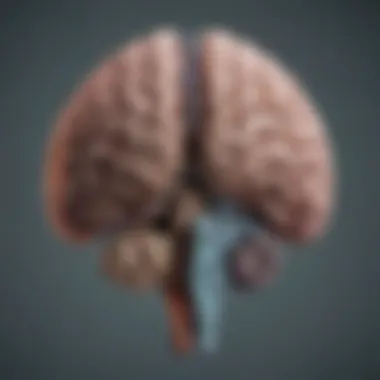Cognitive Impairment: Understanding Medical Perspectives


Intro
Cognitive impairment involves a range of conditions that affect mental processes such as thinking, memory, and reasoning. As populations age and the incidence of neurodegenerative diseases rises, understanding cognitive impairment within a medical framework becomes crucial. This overview addresses the essential aspects of cognitive impairment, laying a foundation for further exploration into its causes, diagnostic measures, and treatment options.
Cognitive impairment can manifest in various forms, each with its unique characteristics and implications. These forms include mild cognitive impairment, dementia, and other less common syndromes. The ability to differentiate these forms is significant for both medical professionals and individuals seeking clarity on the issues related to cognitive functioning.
Given its growing prevalence, a thorough understanding of cognitive impairment is necessary not only for healthcare providers but also for educators and researchers. By combining insights from current literature and clinical practice, this article aims to provide a holistic view of cognitive impairment that enlightens a diverse audience.
Understanding Cognitive Impairment
Cognitive impairment represents a significant public health concern. It encompasses a range of deficits in cognitive functioning, including memory, reasoning, and problem-solving abilities. Understanding cognitive impairment is essential for multiple reasons, especially as life expectancy increases globally. Individuals and healthcare providers alike must recognize the implications of cognitive changes on quality of life and the ability of individuals to perform daily activities.
The importance of understanding cognitive impairment lies in its impact on afected individuals and their families. As cognitive functions decline, it makes independent living challenging. This creates a higher need for support and care, which can impose burdens on families and healthcare systems. Moreover, increasing awareness can promote early intervention, which is vital in slowing progression.
Defining Cognitive Impairment
Cognitive impairment is often defined as a decline in mental abilities that interferes with daily life. This can manifest in various ways, ranging from mild disturbances in memory, such as forgetfulness, to severe conditions like Alzheimer's disease. The diagnosis is largely clinical, relying on neurologists, psychologists, and other healthcare professionals to evaluate the person's cognitive status through interviews and standardized tests.
Some common characteristics of cognitive impairment include:
- Memory Loss: Difficulty recalling new information or long-term memories.
- Poor Problem-Solving Skills: Struggles with familiar tasks or decision making.
- Language Difficulties: Trouble finding words or understanding conversations.
These issues may arise gradually, and individuals may not recognize the changes initially. This gradual onset complicates help-seeking behaviors, often leading to delays in treatment.
Distinction from Other Mental Health Disorders
Cognitive impairment can be confused with other mental health disorders such as depression or anxiety. It is crucial to make this distinction because the management strategies differ significantly. While cognitive impairment primarily affects mental processes, disorders like depression may have cognitive symptoms as a consequence of mood disturbances rather than a primary cognitive deficit.
Differentiating between cognitive impairment and other mental health conditions requires thorough assessments. Symptoms like low motivation or lack of concentration may overlap. Therefore, health professionals must rule out mood disorders before confirming a diagnosis of cognitive impairment.
In addition, cognitive impairment may occur alongside other conditions, such as schizophrenia or bipolar disorder. This co-occurrence adds layers of complexity to diagnosis and management, making a comprehensive evaluation essential for appropriate treatment.
Understanding cognitive impairment requires careful assessment and consideration of its relationship with other mental health disorders, ensuring better patient outcomes.
Types of Cognitive Impairment
Understanding the types of cognitive impairment is essential for both diagnosis and treatment. Each type presents unique characteristics and challenges, impacting the lives of individuals differently. Distinguishing between these types is vital, as it facilitates targeted interventions, allowing healthcare professionals to provide more effective management and support.
Mild Cognitive Impairment
Mild Cognitive Impairment (MCI) primarily serves as an intermediary stage between normal cognitive aging and more severe cognitive decline, such as dementia. Individuals with MCI often experience noticeable memory issues or cognitive problems that are greater than expected for their age but not severe enough to disrupt daily functioning significantly.
Some common symptoms include:
- Frequent forgetfulness, particularly of recent events or conversations
- Difficulty concentrating on tasks
- Trouble finding the right words during conversations
Although MCI does not always progress to dementia, research indicates that individuals with MCI are at an increased risk. Recognizing MCI early offers time for planning and intervention strategies to maintain cognitive abilities longer.
Moderate Cognitive Impairment
As cognitive impairment progresses to a moderate level, individuals may face more pronounced challenges. Moderate cognitive impairment leads to significant functional decline, making it difficult to perform everyday activities without assistance. This stage can affect various domains including memory, reasoning, and executive function.
With moderate cognitive impairment, patients may encounter:
- Increased difficulty with daily tasks, such as managing finances or medication
- Confusion about time or place
- Changes in mood or personality
This level of impairment often requires supportive care and may involve caregivers to assist with daily routines and emotional support. Timely intervention can minimize the impact on quality of life, helping individuals retain independence for as long as possible.
Severe Cognitive Impairment
Severe cognitive impairment represents the most advanced stage of cognitive decline, where individuals struggle to function independently in most aspects of life. At this level, the ability to communicate is significantly impaired, and individuals may lose the capacity to recognize loved ones or their surroundings.
Typical characteristics of severe cognitive impairment include:
- Inability to perform routine tasks without help
- Severe memory loss, often leading to confusion about identity and location
- Loss of verbal communication skills


The focus of care during this stage typically shifts to comfort and maintaining a quality of life. Palliative care and support systems play a critical role in ensuring that the needs of individuals and their families are addressed. Understanding the severe cognitive impairment challenges can guide caregivers and healthcare professionals in prioritizing compassionate care.
Causes of Cognitive Impairment
Understanding the causes of cognitive impairment is crucial for effective treatment and management. Each cause can have distinct effects on cognition and can manifest in various stages. Recognizing these can aid health professionals in designing more tailored therapeutic interventions. Moreover, early identification of causative factors can potentially slow the progression of impairment and enhance the quality of life for affected individuals.
Neurodegenerative Diseases
Alzheimer's Disease
Alzheimer's Disease is perhaps the most recognized contributor to cognitive impairment. It is characterized primarily by memory loss and cognitive decline, commonly associated with aging. This disease damages brain cells and disrupts communication between them. One key characteristic of Alzheimer’s is the formation of amyloid plaques and neurofibrillary tangles in the brain, leading to progressive memory loss and confusion.
Alzheimer's serves as a focal point in discussions about cognitive impairment due to its prevalence and societal impact. Its study has led to extensive research into prevention and treatment strategies. The unique feature of Alzheimer's is that it not only affects memory but also influences daily functioning and emotional wellbeing.
The advantages of focusing on Alzheimer's include a wealth of existing research, support systems, and a variety of ongoing clinical trials aimed at discovering new treatments.
Parkinson's Disease
Parkinson’s Disease poses another significant risk for cognitive impairment, especially as it progresses. While it is best known for its motor symptoms, cognitive decline often accompanies this disease, significantly affecting concentration and executive function. One key characteristic is the gradual change in dopamine production, which influences many brain functions, including mood and cognitive processes.
Parkinson's is also important in this discussion because it provides a perspective on how a physical disorder can lead to cognitive issues. This aspect allows the healthcare community to explore multifaceted treatment approaches. The unique feature of Parkinson's related cognitive impairment is that it typically occurs later in the disease's course, making early intervention more challenging but also vital.
Chronic Medical Conditions
Diabetes
Diabetes, particularly when poorly controlled, can be a significant contributor to cognitive impairment. Hyperglycemia and fluctuations in blood sugar levels can damage blood vessels in the brain. One critical aspect of this condition is its pervasive nature, affecting millions globally.
Diabetes is a beneficial topic in relation to cognitive impairment because it raises awareness of the importance of metabolic health in maintaining cognitive functions. The unique feature of diabetes-related cognitive impairment is the relationship between physical health and mental acuity. Addressing diabetes management can positively influence cognitive outcomes, making it a critical area of focus.
Cardiovascular Problems
Cardiovascular problems can lead to issues with blood flow to the brain, resulting in various cognitive impairments. Hypertension and atherosclerosis are notable contributors that can precipitate conditions like vascular dementia. A key characteristic of these conditions is that they often affect older adults and can lead to a gradual decline in cognitive ability.
This topic is relevant because cardiovascular health is often ignored in discussions about mental functioning, despite its critical connection. The unique feature here is that managing cardiovascular conditions can not only improve physical health but also cognitive clarity, enriched by studies linking heart health and brain health.
Infectious Diseases
HIV/AIDS
HIV/AIDS can have profound effects on cognition, often leading to what is termed HIV-associated neurocognitive disorder. The virus affects brain function directly and indirectly through inflammation and opportunistic infections. A notable aspect of this condition is the stigma and misunderstanding surrounding it which can hinder individuals from seeking treatment.
HIV/AIDS brings light to the intersection of infection and cognitive decline, making it an essential aspect of cognitive impairment discussions. The unique feature of cognitive impairment in this context is the potential for reversibility with treatment, which provides a glimmer of hope.
Encephalitis
Encephalitis, which is inflammation of the brain, can result in several cognitive deficits depending on its severity. It can lead to impaired memory, changes in behavior, and even long-term cognitive impairment. A key characteristic is the immediate danger it poses, requiring urgent medical intervention.
Discussing encephalitis in this article is useful due to its acute nature and the way it highlights the brain’s vulnerability to infections. The unique feature of this condition is its potential for dramatic recovery with timely treatment, making awareness and early diagnosis vital.
Substance Abuse
Alcohol
Alcohol abuse is a leading cause of cognitive decline. Chronic use can lead to Wernicke-Korsakoff syndrome, significantly impairing memory and cognitive functions. A critical aspect of alcohol-related cognitive impairment is the reversible nature of some impacts with abstinence.
The discussion around alcohol is important as it is a widely accepted social substance, often overlooked in cognitive impairment assessments. The unique feature of alcohol-related impairment is that any cognitive decline may not only be physical but can also have significant psychological implications.
Drugs
Drug abuse, including prescription medications, can severely impact cognition. Whether through direct neurotoxicity or secondary effects like withdrawal, the cognitive consequences can be significant. The prominent characteristic is that many drugs can lead to a spectrum of cognitive challenges.
The inclusion of drug abuse in this article is critical due to its increasing prevalence in modern society. Its unique feature lies in the multifactorial nature of dependence, where biological, psychological, and social elements intertwine to exacerbate cognitive impairment.
Symptoms and Diagnosis


Understanding the symptoms and diagnosis of cognitive impairment is critical for effective management and treatment. Symptoms can be subtle and may progress slowly, making early detection challenging. Recognizing these symptoms can lead to timely interventions that may improve outcomes for individuals affected by cognitive impairment. Furthermore, accurate diagnosis relies on a combination of clinical assessments and tools that can give comprehensive insights into a person's cognitive functions. This section explores common symptoms, diagnostic criteria, and assessment tools to paint a clearer picture of how cognitive impairment manifests and can be effectively identified.
Common Symptoms
Memory Loss
Memory loss is one of the most recognizable signs of cognitive impairment. It can range from occasional forgetfulness to significant memory deficits. This is often the first symptom that family members or caregivers notice. It plays a central role in assessing cognitive health. Its pervasive nature highlights how essential memory is to daily functioning.
Key characteristics include forgetting recently learned information or important dates. Memory loss can severely impact personal and social interactions, making it a significant concern in this context. It is a popular choice for discussion in this article due to its direct correlation with the overall cognitive impairment definition. The disadvantage of memory loss is that it can sometimes be attributed to normal aging or stress, complicating early detection.
Difficulty Planning
Difficulty in planning shows an impairment in executive functioning skills. This can manifest as trouble organizing tasks, following a series of steps, or completing everyday activities. Such challenges hinder an individual's ability to manage daily responsibilities effectively.
The key characteristic of difficulty planning is the struggle to devise strategies for accomplishing tasks. This symptom offers a significant insight into an individual's cognitive status. Its inclusion in this article is beneficial because it reveals subtle yet critical signs of cognitive decline. While difficulty planning can be indicative of wider issues, it might also stem from factors like anxiety or depression, posing a risk of misdiagnosis.
Language Problems
Language problems refer to difficulties in speaking, understanding, reading, or writing. These challenges can impact communication significantly. Individuals may struggle to find the right words or understand conversations. This symptom often becomes evident during social interactions.
The key hallmark of language problems is the loss of fluency in speaking or writing. Its presence highlights the degree to which cognitive impairment can interfere with fundamental daily functions. Its discussion in this article is helpful because it underscores language's role in interpersonal connections. However, language issues can arise from stroke or other medical conditions, which can complicate diagnostic assessments.
Diagnostic Criteria
The diagnosis of cognitive impairment is grounded in specific criteria established by healthcare professionals. This includes evaluating the degree of cognitive decline, its impact on daily living, and ruling out other conditions that can mimic cognitive impairment. Common frameworks used for diagnosing include the DSM-5 criteria and the National Institute of Health guidelines. A thorough history taking and neurological examination complement cognitive assessments, guiding clinicians in forming an accurate diagnosis.
Assessment Tools
Neuropsychological Tests
Neuropsychological tests are specifically designed to evaluate cognitive functions comprehensively. These tests measure various domains, including memory, attention, language, and problem-solving skills. Their structured approach offers a standardized way to assess cognitive abilities against established norms.
The key characteristic of neuropsychological tests is their objectivity. They allow for the identification of strengths and weaknesses in cognitive capabilities, making them a valuable resource in this article. However, the main disadvantage is the time investment required to administer these tests and the potential for anxiety they may cause during evaluation.
Imaging Techniques
Imaging techniques, such as MRI and CT scans, provide crucial insights into the brain's structure and function. These tools help in identifying physical changes in the brain that accompany cognitive impairment. They serve to rule out other neurological conditions and support clinical findings.
The main feature of imaging techniques is their ability to visualize potential causes of cognitive impairment. Their role is significant in documenting the bio-medical aspects of cognition. This information is beneficial in this article as it provides a clear link between physical brain health and cognitive functioning. Despite the advantages, imaging does not always correlate directly with cognitive performance due to individual variabilities.
Impact on Daily Life
Understanding how cognitive impairment affects daily life is crucial for individuals, families, and healthcare professionals. This section highlights the multifaceted nature of cognitive impairment and its direct influence on personal relationships, work performance, and social engagement.
Effects on Personal Relationships
Cognitive impairment often disrupts personal relationships. Individuals may experience changes in communication skills and emotional regulation. For instance, memory loss can lead to forgetting important dates or events, which may frustrate and alienate family and friends. Such challenges can create feelings of isolation or withdrawal in both the affected individuals and their loved ones.
Some research shows that caregivers also often face increased stress. They may not only need to adapt to altered dynamics within the relationship but also manage caregiving responsibilities. Understanding these impacts is essential for developing coping strategies and communication techniques that can strengthen bonds and improve relational quality.
Influence on Work Performance
The impact of cognitive impairment on work performance can be profound. Individuals may find it difficult to concentrate, solve problems, or follow instructions. As tasks become overwhelming, productivity may decline. This decline in work performance can affect job security and professional reputation, further leading to distress.
Employers benefit from recognizing these challenges and offering support. Flexible working hours, modified duties, and access to mental health resources can assist affected employees in maintaining their performance. Addressing cognitive impairment in the workplace can lead to a more inclusive atmosphere and better outcomes for both employers and employees.
Social Engagement Challenges
Cognitive impairment can severely hinder social engagement. Participating in community events or gatherings may feel daunting for those affected. Social anxiety can escalate, leading to avoidance behaviors. As social circles shrink, feelings of loneliness and depression may emerge.
To combat this, it is essential for families and friends to encourage engagement in social activities tailored to the individual's interests. Community programs designed for those with cognitive challenges can help facilitate a supportive environment. By addressing these social engagement challenges, individuals can improve their overall well-being and quality of life.
"Proper management of cognitive impairment not only enhances individual well-being but also fosters healthier connections within communities."
Treatment and Management


Treatment and management of cognitive impairment is a complex and essential area of focus. It holds significant importance, as appropriate intervention can improve quality of life for those affected. There are various strategies available for management, including pharmacological treatments, rehabilitation methods, and lifestyle changes. Each element contributes to a comprehensive approach in addressing cognitive decline. The overall goal is to maintain cognitive function as much as possible while also managing associated symptoms.
Pharmacological Interventions
Pharmacological interventions play a crucial role in treating cognitive impairment, particularly in conditions like Alzheimer's disease. These medications may help enhance cognitive function and slow the progression of symptoms.
Cholinesterase Inhibitors
Cholinesterase inhibitors are among the most prescribed medications for cognitive impairment. These drugs work by increasing levels of acetylcholine, a neurotransmitter that is often deficient in patients with dementia. A key characteristic of cholinesterase inhibitors is their ability to moderately improve cognitive symptoms in some patients.
Their benefits include potential improvements in memory and cognitive functions. Names like Donepezil, Rivastigmine, and Galantamine are common examples. However, one disadvantage is the presence of side effects such as nausea and diarrhea, which may affect patient compliance. The efficacy of cholinesterase inhibitors can vary significantly among individuals. Therefore, careful monitoring and adjustments are often necessary for optimal results.
Memantine
Memantine represents another option within pharmacological interventions. This medication works mainly by regulating glutamate activity, which plays a role in learning and memory. A notable characteristic of memantine is that it has a different mechanism of action compared to cholinesterase inhibitors, making it suitable for patients who cannot tolerate these drugs.
Memantine is especially beneficial for moderate to severe cognitive impairment. Its unique feature lies in its potential to stabilize symptoms for an extended duration. Nevertheless, some drawbacks include possible side effects such as dizziness or confusion, which need to be carefully managed during treatment.
Cognitive Rehabilitation
Cognitive rehabilitation is a therapeutic approach aimed at retraining the brain. Through targeted cognitive exercises, patients can improve specific cognitive functions that may be impaired. This method includes memory training, problem-solving tasks, and strategies for improving attention. Its effectiveness often varies based on the individual’s condition and goals. Regular sessions are recommended to achieve noticeable results.
Lifestyle Modifications
Lifestyle modifications are key elements in the management of cognitive impairment. These interventions can complement medical treatments and improve overall health outcomes.
Diet
Proper diet plays an important role in cognitive health. A balanced diet rich in antioxidants, healthy fats, and vitamins may support brain function. Emphasizing foods like berries, fatty fish, and leafy greens can be particularly beneficial. This aspect is significant, as nutrition can influence overall cognitive performance. The advantages of following a healthy diet include better energy levels and improved mood, which also affect cognitive capabilities.
Exercise
Regular exercise contributes significantly to cognitive well-being. Physical activity increases blood flow to the brain, promoting the growth of new neurons. This aspect is why exercise is recommended as a beneficial approach in managing cognitive decline. Exercise can reduce the risk of developing additional complications and can enhance mood and energy levels. Nevertheless, patients should choose activities that align with their capability to avoid injury.
Effective management of cognitive impairment often requires a combination of pharmacological treatments, cognitive rehabilitation, and lifestyle changes. Each patient’s journey is unique, necessitating personalized approaches for optimal outcomes.
Future Directions in Research
Research on cognitive impairment is essential as it guides the understanding of this complex condition. Continued investigation offers insights that can lead to improved treatments and diagnostic techniques. Exploring future directions helps in identifying gaps in current knowledge, paving the path for innovative methodologies.
Emerging Treatment Approaches
The landscape of treatment for cognitive impairment is rapidly evolving. Emerging treatments explore non-invasive options and novel drugs. Current studies focus on pathophysiological mechanisms, aiming at targeted interventions.
In particular, therapies such as gene therapy and stem cell treatment are in development stages. These advancements promise not only to alleviate symptoms but also to address the underlying causes of cognitive decline. Additionally, studies on neuroprotective agents aim to delay the progression of conditions like Alzheimer's disease.
In terms of pharmacology, researchers are also looking into new classes of medications that can enhance cognitive function. Examples include medications that modify neuroinflammatory processes or act on neurotransmitter systems. As these strategies evolve, they could significantly alter the management of cognitive impairment.
Technological Innovations in Diagnosis
Technological advancements bring new hope in diagnosing cognitive impairment. Researchers are leveraging artificial intelligence and machine learning to analyze brain imagery. These technologies enhance early detection resulting in timely intervention.
For instance, advanced neuroimaging techniques, such as functional MRI and positron emission tomography (PET), allow for more precise mapping of brain functions. Furthermore, wearable devices are gaining traction, enabling continuous monitoring of cognitive health. This approach could revolutionize the way cognitive deficits are evaluated and managed.
“Innovative technologies can enhance the accuracy of diagnoses, potentially leading to better clinical outcomes for patients.”
Longitudinal Studies and Their Importance
Longitudinal studies play a crucial role in understanding cognitive impairment over time. They provide insights into the progression of the condition and the efficacy of treatments. By tracking populations over several years, researchers can identify risk factors and protective measures.
Such studies offer a comprehensive perspective on cognitive decline as they examine various influences like lifestyle, genetics, and environmental factors. Findings from longitudinal research can guide public health interventions and inform policy decisions. They also support the development of tailored treatment plans based on individual patient profiles.
The End
Cognitive impairment carries significant weight in both clinical and everyday contexts. Understanding its nuances is essential for addressing the challenges faced by affected individuals. This article pulls together diverse elements of cognitive impairment, clearing the fog around its definitions, types, and consequences.
Summary of Findings
The comprehensive review of cognitive impairment discussed here reveals several critical insights. First, we articulated the various types of cognitive impairment, each presenting unique challenges. Mild cognitive impairment, moderate stages, and severe forms each demand different approaches in management and treatment. We also dissected causal factors, ranging from neurodegenerative diseases to chronic medical conditions that can exacerbate cognitive decline. Indeed, engaging with this complexity equips health professionals with the necessary insight to tailor interventions effectively.
Implications for Practice
The implications drawn from this exploration are profound. Practitioners must remain vigilant about the diagnostic criteria and assessment tools available to them. Methods such as neuropsychological tests and imaging techniques are fundamental in establishing accurate diagnoses. Moreover, the insights gained here could inform treatment approaches. Health professionals are encouraged to consider a multidisciplinary strategy that integrates pharmacological and non-pharmacological modalities.







